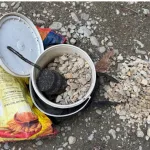Srinagar, March 21: The brick kilns in Central Kashmir’s Budgam district are affecting agriculture and crop production which has become cause of concern for hundreds of farmers in the district.
As per the figures of the State Pollution Control Committee and District Administration Budgam of the 282 brick kilns operating in Kashmir, 232 are located in Budgam as it has quality clay in its karewas.
Arshid Ahmad, a resident of Budgam said over the years there has been a decline in the karewa land as the district has many brick kilns. He said the soil which is the material used for making bricks is taken from these karewas.
“Brick kilns are already polluting the environment and these also have caused a lot of damage to the karewa land. In the future the agricultural land would face further damage if the excavation continues like this,” he said.
“Karewa was the natural topography in Kashmir but it is being damaged and pollution and particulate matter is also increasing which affects vegetation,” the resident said.
Rayees Ahmad, a resident of Malpora Beerwah said over the years they have been voicing their concern against brick kilns and they were able to stop some three brick kilns.
“We have been able to stop four brick kilns and saved 700 kanals of productive land after so much agitation. We were also able to demolish two brick kilns at Utligaam with the support of civil society, pollution control board and district administration,” he said.
He said the fertility of the land in and around the brick kilns has affected crop production, especially paddy in the villages.
“In Budgam, the green pastures and huge paddy and landscape fields were once famous and these have been affected due to smoke of churning chimneys, tipper trucks and brick loads across the village fields,” Rayees said.
Sajad Ahmad, a resident of Beerwah said due to brick kilns they have observed a sea of changes in their apple orchards over the past years and apple production has also been affected.
“The air pollutants have severely affected the leaves due to which apple trees are unable to complete the photosynthesis ultimately affecting the fruit. Trees also don’t have proper growth. When we pick apples we see a huge layer of black dust on leaves and fruits. We lose 30 percent of the quality of apples in the orchards,” he said.
“Both agriculture, as well as horticulture land, has lost fertility. The kilns have not only affected the land near the kilns but at the entire area,” he said.
A senior official in the District Administration Budgam said that the administration has already constituted teams and violators are fined when found involved in illegal activities.
“We are holding a close vigil on all the brick kilns across the district. We appealed to people to contact the district administration in case of any violations,” he said.





